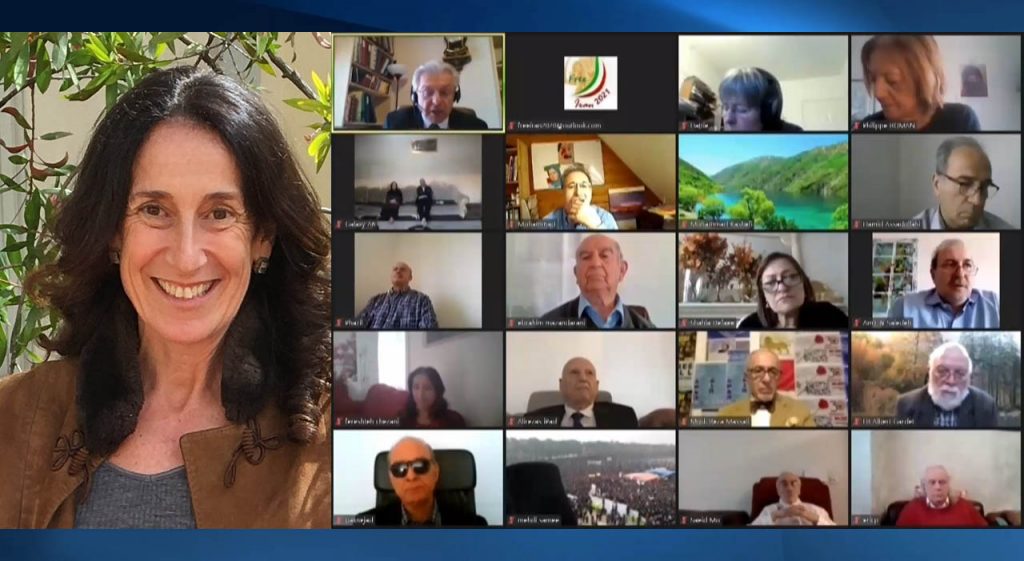The following is the text of remarks by Prof. Annalisa Ciampi at an online conference by international human rights experts and NGOs on 28 February 2022, appealing to the United Nations High Commissioner for Human Rights Michelle Bachelet to launch an inquiry into the 1988 massacre of political prisoners in Iran:
Thank you very much, and good morning to all.
I speak in my personal capacity now, and I also speak as one of the co-signatories of the letter which was addressed in January of this year to the Member States and Observers of the Human Rights Council calling for an international investigation into the 1988 massacre.
The facts have already been recalled by the first speaker. The decree is known. We know some of the names of the victims, we know some of the names of the perpetrators, and whether we want to qualify those facts as crimes against humanity or genocide, I agree they are core crimes, and they call for international criminal responsibility, international individual criminal responsibility, irrespective of official capacity, including therefore heads of state, the current head of state, the head of the judiciary and other prominent officials.
This is the principle, but then the reality is difficult. It would indeed be difficult to bring the perpetrators at this moment before the International Criminal Court. It doesn’t seem a current prospect to be able to establish ad hoc tribunals or hybrid tribunals. It is useless to call again for accountability before Iranian domestic courts. Yes, there is universal jurisdiction. It is possible to have domestic accountability before other courts and tribunals around the world.
To my knowledge, there is one criminal prosecution in Sweden at the current time as we speak, but that’s one. So, what else?
International criminal law doesn’t seem to be a viable option nowadays, nor the main exit door at this particular moment, but human rights are an option now. International human rights law is there because these facts are serious international crimes, but they are also serious human rights breaches, violations, and abuses. Enforced disappearances, summary executions, extrajudicial killings – these are serious violations of human rights, and they are continuous violations, because under international human rights law, the doctrine of positive observation – which is not a principle but a practice – mandates investigations into those crimes.
So, I come to the call that will be before the Human Rights Council two weeks from now. It’s already in the report of the current UN Special Rapporteur on Iran, a call for accountability into the massacres because these are continuous violations which are still ongoing nowadays.
What are the options before the Human Rights Council? How could this call for accountability be operationalized? What should the Member States do? What are we calling on them to do? Several options are open, and several options have been resorted to in the practice of the Human Rights Council. The strongest response would be to set up a Commission of Inquiry, as was set up in Burundi for example.
But other options, if those are politically available and feasible, should be pursued. A Fact-Finding Mission or a group of experts. Recently, the EU member States were at the forefront in the Human Rights Council in the setting up of a group of experts to investigate allegations of violations in Ethiopia.
So, my call and my prayer are to the Member States to put that political will behind this call that the Special Rapporteur will put before them in a few weeks’ time. The call is a call for accountability, but it’s also and most importantly, in my view and that’s my strongest belief, for the purpose of prevention of ongoing violations and future violations as well. The previous speaker already recalled the protests of 2019, and again a repetition by the Iranian authorities of major breaches of international criminal law and human rights law. We saw a crackdown on the protests that was as serious as the violations of 1988. So, to me this is the main message we want – we ask for investigation and accountability. We ask the Member States to put that political will for what happened in 1988, for what happened again in 2019, for what is still ongoing – because until there will be an investigation and the victims will be given, at the very least, a right to the truth, these serious human rights violations and core crimes will be still ongoing. Thank you.
Prof. Annalisa Ciampi is an Ad hoc Judge of the European Court of Human Rights (ECHR) and Professor of International Law at the University of Verona; former UN Special Rapporteur on the Rights to Freedom of Peaceful Assembly and of Association; former member of the European Committee of Social Rights of the Council of Europe (2008-2009); former Legal Adviser to the Italian Ministry for Foreign Affairs

